— Topics —
When you eat (Chrono-nutrition)
2023.11.03
How Meal Frequency Affects Weight Gain or Loss
Contents
- Background on the relationship between meal frequency and body weight
- Frequency of eating is also related to intestinal starvation
- Conclusion
1. Background on the relationship between meal frequency and body weight
(1) More than fifty years ago, it was reported that lower meal frequency was associated with increased body weight. Since then, a number of observational studies have supported this notion. In a randomized crossover study conducted inside a metabolic chamber, when meal frequency was reduced from three to two meals per day (breakfast and dinner), perceived satiety decreased acutely in lean women[1].
(2) Epidemiological reports have shown a favorable relationship between increased meal frequency, body weight, and metabolic health, and some researchers and nutritionists recognize the consumption of multiple small, regular meals as a dietary approach that may limit weight gain. Increased meal frequency has also been advocated as a dietary strategy to promote weight loss by enhancing satiety and reducing hunger, increasing energy expenditure, and improving metabolic health.

However, intervention trials do not generally support the epidemiological evidence. In today's obesogenic environment, prescribing increased eating opportunities may inadvertently lead to over-consumption and weight gain.
This is especially important in light of recent evidence that more frequent over-consumption of energy-dense foods results in poorer metabolic health[2].
(3) A study using the date from INTERMAP study (International Study on Macro/Micro nutrients and Blood Pressure), conducted four times between 1996 and 1999, suggests that a larger number of small meals may be associated with improved diet quality and lower BMI.
Participants with an average of 6 EO (eating occasion) had higher DQI (diet-quality indices) and lower BMI compared to those with <4 EO, indicating that frequency reflected of a pattern of overall health-promoting behaviours[3].
(4) Conversely, in a study based on data from 50,660 relatively healthy North American adult members aged ≥30 years (Adventist Health Study), eating more than three meals per day (snacking) was associated with a relative increase in BMI, implying that increased EO was associated with increased energy intake[4].
Given these considerations, eating frequency appears to be a secondary factor to the context of energy balance and broader health-promoting behavioural patterns[5].
(5) Elucidating human dietary patterns presents challenges for nutritional epidemiology. Food frequency questionnaires (FFQs) are generally designed to capture average intake over a specific reference period, rather than timing of meals. However, standardized operational definitions for "meal" and "snack" remain lacking and may result in discordant findings when timing of food intake, frequency and (ir)regularity are the outcomes of interest.
Some researchers apply a minimum energy criterion (i.e. >50 kcal ) to snacks, but meals are characterized by predefined, culturally, and socially-driven labels of ‘breakfast’, ‘lunch’, and ‘dinner’, which vary from culture to culture[6].
2. Frequency of eating is also related to intestinal starvation
Some experts say that, “if the total daily caloric intake is the same, it doesn't matter how many meals a day you eat," but I am positive that how many times you eat definitely affects your weight gain (or loss).
I mentioned that the phrase "gaining weight" has two meanings, and based on that idea, I believe it is relatively easy to explain that. Allow me to explain parts (A) and (B) of the following diagram.
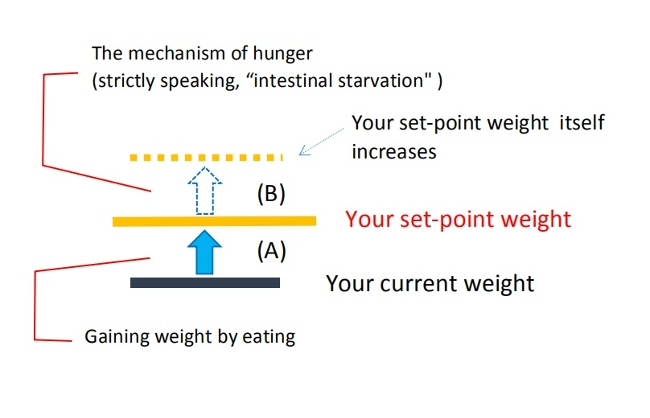
(1) As for part (B), the frequency of eating has a lot to do with it.
Since one's set-point weight itself goes up through intestinal starvation, eating more frequently and in a more spread-out manner, is less likely to result in weight gain. When you feel a little hungry, other foods enter your stomach again, which means that undigested foods are more likely to remain in your gastrointestinal tract.
If a person who is naturally slim or has a medium build maintains such a lifestyle, it is more likely that weight gain will be limited, and this will be consistent with observational studies showing a favorable relationship between increased meal frequency, body weight, and metabolic health.
Conversely, eating less frequently (e.g. two meals a day) and longer intervals between meals can lead to weight gain, depending on the foods you combine.
In my theory, meal frequency is synonymous with "meal intervals" and is one of the necessary conditions for intestinal starvation to be induced. As mentioned in the articles "Breakfast" and "Late Night Eating," two meals a day, with meals skewed toward easily digestible carbohydrates and proteins, and a lack of vegetables and dairy products, etc., can lead to intestinal starvation and an increase in set-point for body weight over time.
This is consistent with an observational study from over fifty years ago, which reported that "lower meal frequency was associated with increased body weight.”
(2) As for part (A), I believe that meal frequency is not really relevant.
This is the part where many people believe that taking in more calories makes you fat, which means going back to their set-point weight. Therefore, it should be the total daily caloric intake or carbohydrate intake that matters, rather than how many meals you eat a day. People who normally keep their weight lower through dieting or who cut excess body fat through workouts can gain weight if their caloric intake is higher than necessary due to increased frequency of eating.
As cited in section 1-(2) above, I believe that the research finding in intervention trials that "prescribing for increased eating opportunities for obese individuals may inadvertently lead to over-consumption and weight gain" applies to this part (A).
3. Conclusion
(1) Based on my theory, I believe I can explain the relationship between meal frequency and body weight more concretely as in section [2] above.
The most important factor in the conditions that cause intestinal starvation is "What to eat," but the meal frequency (meal intervals) can have different effects on body weight, even with the exact same daily intake. While there is no denying the fact that meal frequency is "a secondary factor in the context of energy balance and broader health-promoting behavioural patterns," it is certainly an important factor.
(2)In my opinion, two meals a day tend to make people gain weight-meaning that a person’s set-point weight goes up-but four or five meals a day may also increase their set-point weight.
A friend of mine gained more than ten kilograms by eating four to five meals a day when he was studying for a college entrance exam after he failed the first try. From what I heard, he was very thin in high school, even though he belonged to a judo club, and ate a lot of calories.

When I asked him about his weight gain, he told me that light meals such as hot dogs, rice balls, and instant noodles made up more than half of those meals.
As cited in section 1-(5) above, if the definitions of "meal" and "snack" are vague, and even a light meal that is high in carbohydrates and low in vegetables is counted as "one meal," then there is no point in discussing meal frequency. Even in observational studies using questionnaires, etc., discordant findings can occur.
(3) Depending on the subject of the observational study, mixed results can occur in the relationship between meal frequency and body weight.
If a thin or a person with a medium build eats three well-balanced meals and snacks on doughnuts or cookies between meals, this will not be a reason for an increase in set-point for body weight.
In contrast, a larger or obese person may eat four or five times a day as a result of being too hungry. Assuming that as a person’s body increases in size, the stomach and intestines also increase in size and their digestion gets stronger, therefore, we can say that they will feel hungry faster even if they eat the same food as others.
(4) I have no doubt that increasing the frequency of meals has great potential to help with weight loss.
Of course, one should not eat a diet that leans toward carbohydrates and some meats, such as fast food, ramen noodles, snack breads, etc.
However, I believe, as seen in low-carb diets, it is possible to lose weight by basing the diet with fewer carbohydrates and more from the other food groups such as vegetables, protein, dairy, oils, and nuts. (Even when eating carbohydrates, unrefined rice or whole wheat bread, or al dente pasta,etc. which takes longer to digest, are preferable.)

The key, in my opinion, is to leave more undigested food in your intestinal tract, and to reduce the period of time feeling hunger. I believe that this will not only increase energy expenditure (diet-induced thermogenesis), but also decrease absorption ability.
[Related article]
There Are Two Steps to Lose Weight the Right Way
<References>
[1][2]Hutchison AT, Heilbronn LK. Metabolic impacts of altering meal frequency and timing - Does when we eat matter? Biochimie. 2016 May;124:187-197. doi: 10.1016/j.biochi.2015.07.025. Epub 2015 Jul 29. PMID: 26226640.
[3]Aljuraiban GS, et al. The impact of eating frequency and time of intake on nutrient quality and Body Mass Index: the INTERMAP Study, a Population-Based Study. J Acad Nutr Diet. 2015 Apr;115(4):528-36.e1. doi: 10.1016/j.jand.2014.11.017. Epub 2015 Jan 22. PMID: 25620753; PMCID: PMC4380646.
[4]Kahleova H et al., Meal Frequency and Timing Are Associated with Changes in Body Mass Index in Adventist Health Study 2. J Nutr. 2017 Sep;147(9):1722-1728. doi: 10.3945/jn.116.244749. Epub 2017 Jul 12. PMID: 28701389; PMCID: PMC5572489.
[5][6]Flanagan A, et al., Chrono-nutrition: From molecular and neuronal mechanisms to human epidemiology and timed feeding patterns. J Neurochem. 2021 Apr;157(1):53-72. doi: 10.1111/jnc.15246. Epub 2020 Dec 10. PMID: 33222161.
2023.10.15
Does Eating Late at Night Really Make You Fat?
Contents
- Recent findings on the association between late night eating and weight gain
- Are late night meals really fattening? (My thoughts)
- It is impossible to explain weight gain with BMAL1.
- Conclusion
In Japan, many people (especially women) tend to avoid eating dinner, or dessert or sweets late at night (after nine p.m.) because they do not want to gain weight.
But does that really make sense? Actually, some people say that they have started eating dinner late at night and gained more weight than before, but I believe that is a misconception.
1. Recent findings on the association between late night eating and weight gain
(1) A cross-sectional study examining 17-year changes in energy and macronutrient intake across eating occasions in the 1946 British birth cohort, reported a greater proportion of energy towards the latter half of the day, and as a population, there has been a shift in the timing of when we eat[1].
In a cohort study of 1,245 non-obese, non-diabetic middle-aged adults, participants who consumed 48% or more of their daily energy intake at dinner were twice as likely to be obese at a six-year follow-up, even after adjusting for variations in energy intake, physical activity, and BMI, etc. at baseline[2].

(2) An increased propensity for weight gain is observed in those with eating occasions extending into the night hours, when the body is usually primed for rest, such as night shift workers and shift workers[3].
A meta-analysis published in 2018 reviewed 28 studies and found that shift workers had a higher frequency of developing abdominal obesity than other obesity types.
Permanent night workers demonstrated a 29% higher risk of obesity/being overweight than rotating shift workers[4].
(3) Previous observational studies in humans have linked late eating with higher obesity risk and lower success rates of dietary and surgical weight loss that could not be explained by differences in reported caloric intake or physical activity. It has been suggested that meal timing itself might influence body weight independent of changes in energy intake and activity-related energy expenditure[5].
(4) A systematic review published in 2017 investigated the relationship between evening energy intake and BMI. Of the 121 relevant articles, ten observational studies and eight clinical trials were included in the systematic review (a total of 102 texts did not meet the review eligibility criteria).
Four of the observational studies showed a positive association with BMI, five showed no association, and one indicated a weak, inverse relationship. The meta-analysis of observational studies showed only a slight trend between greater BMI and greater evening energy intake.
The majority of clinical trials reported that a smaller evening meal produced greater weight loss; however, the meta-analysis showed no significant difference between groups.
(Of note, there is considerable inconsistency in the definition of meal timing, quantification of energy intake, and methods of dietary assessment, suggesting that the heterogeneity of the included studies may have affected the reliability of the study results.)[6]
(5) In a randomized controlled crossover trial published in 2022, sixteen overweight or obese subjects completed two laboratory protocols: one with a strictly controlled early meal schedule, and the other with the exact same meals, each scheduled about four hours later in the day.
The results showed that late eating increased hunger, decreased energy expenditure, and affected molecular pathways in adipose tissue.
This study aimed to investigate the direct effect of meal timing, so other effects were isolated by controlling for confounding variables such as caloric intake, physical activity, sleep, and light exposure. But in real life, many of these factors may themselves be influenced by meal timing[7].
2. Are late night meals really fattening? (My thoughts)
If protein and fat synthesis is stimulated more when sleeping, by hormones and other factors, it is not surprising that, in a sense, everyone is somewhat more likely to gain weight at night than in the morning or afternoon. That further complicates the issue. However, I don’t think It is always correct to associate night time eating with an increased risk of obesity.
As I mention in the following article, I believe that "meal timing" is not the only important factor in the increased risk of obesity, "what you eat" has to be included. Eating late at night and skipping breakfast are two sides of the same coin, and that such eating habits, when combined with an unbalanced diet, can easily lead to intestinal starvation, making people more likely to gain weight over time. I would like to explain the following four patterns.
[Related article] "When to Eat" Is Important, but It Should Be Paired With "What to Eat"
(1) When each meal is four hours late
As shown in section 1, a short-term intervention trial in 2022 showed that meals scheduled four hours later compared to early meal schedule affects appetite, energy expenditure, and molecular pathways in adipose tissue, but it remains unclear whether it makes people obese in the long run.
I used to work as a cook at a Japanese restaurant, and this is how I timed my meals. I ate a light breakfast around nine a.m., and lunch was served around three p.m. Dinner was after eleven p.m., when the restaurant was closed, but I have seen a few acquaintances who have put on weight because of this.
The typical cooks or employees working in restaurants also generally delay their meals by three to four hours, but if they eat a balanced meal at breakfast and lunch, and the meal intervals are consistent, it is unlikely-at least in Japan-that this will significantly increase their risk of obesity.
Of course, some people do gain weight over time or suddenly, but I believe that it is "what they eat" that matters. If they continue their eating habits, such as eating unbalanced meals leaning toward easily digestible carbohydrates and skipping breakfast, they will be more likely to gain weight over the long haul.
If researchers wanted to investigate whether slim people actually gain weight by continuing this pattern of eating, they could find out by asking restaurant staff to cooperate and having them eat the same meal menu three times a day (breakfast, lunch, and dinner).
(2) Longer intervals between lunch and dinner
I believe that the typical pattern when late eating causes weight gain is that lunch is consumed around noon, and dinner is delayed until around eight or nine p.m.
A friend of mine works in sales for his company. He travels by a car, and he says he usually eats his dinner around eight or nine p.m. He used to be slender, but after he got married, he had less pocket money at his disposal, and sometimes he had to eat simple meals such as ramen/udon noodles or a Japanese beef/chicken rice bowl, etc. for lunch.

He had gained more than ten kilos during the previous two years, but I believe this is more of a problem of having simple lunches skewed toward carbohydrates and putting up with hunger for longer periods of time, rather than having a late dinner.
This is the same as the inverted triangle-type diet described in the breakfast article, in which breakfast and lunch are light, and dinner makes up for the missing nutrients and calories.
In that case, intestinal starvation is more likely to be induced before a late dinner, and the set-point weight may unknowingly go up.
(3)Snacking before bed and skipping breakfast
Also, some people may snack or eat a light meal after dinner but before bed , but perhaps those people are prone to skipping breakfast.
As shown in the quote in section [1], there are observational studies showing that "eating at night increases the risk of weight gain over time," but in my opinion, late eating can also be related to skipping breakfast (having two meals a day) or eating light meals during the day.
If people skip breakfast, and night time meals and lunches are unbalanced leaning toward easily digestible carbohydrates and some protein, with a lack of vegetables, they are more likely to induce intestinal starvation little by little over time.
Conversely, if you consume a well-balanced meal including fibrous vegetables, dairy products, protein, and fat, etc., at an earlier time of the day, you can prevent intestinal starvation because undigested foods will remain in the intestines for a longer period of time.
(4) Night time snacking may not cause weight gain
If people eat regular, well-balanced meals three times a day, every day, then for many of them, I believe eating before bed does not cause much weight gain.
As I mention throughout this blog, if a person who normally moderates their caloric intake eats sweets or ramen noodles late at night, they may gain a few kilograms, but it means their present weight goes back to their set-point weight.
Actually, there are many thin people in Japan, but even if they eat sweets or a light meal before bedtime in addition to their three meals in order to gain weight, it is more likely that they will not gain weight. In fact, I suppose that some of them may even lose weight if they do not have a strong digestive ability (at least for me, this is one hundred percent true).

The reason being that, by nature, it is good to rest your body and your stomach while you sleep, but if you eat before going to bed, your gastrointestinal tract has to continue to work throughout the night (diet-induced thermogenesis).
I suspect that this may be burdensome and result in a decrease in both cellular regeneration and synthesis of protein and lipids.
3. It is impossible to explain weight gain with BMAL1
In Japan, some experts explain as if the secretion volume of BMAL1 (Brain and Muscle Arnt-like protein-1 ) and weight gain are correlated. BMAL1 is a protein involved in the biological clock, and is said to be related to adipogenesis.
Its secretion begins to increase around six p.m. and peaks between ten p.m. and two a.m., which seems to be thought of as a rationale behind the fact that people are several times more likely to gain weight if they eat late at night (e.g. ten p.m.) than eating at six p.m. for the same number of calories.
However, I think that explanation is a bit of a stretch. The reason is that the "digestion time" is missing. For example, if they eat a meal at ten p.m., it will take four to six hours for it to be digested and absorbed, depending on the person and how foods are combined, etc. Fats/oils are particularly indigestible, so they may find that even in the morning after seven to eight hours, their food is still undigested and their stomach is upset.
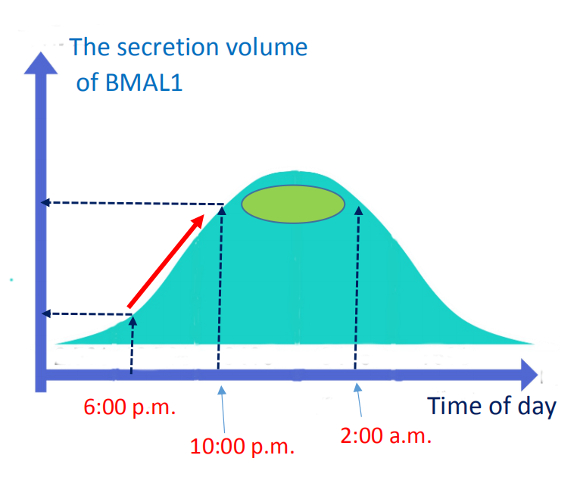
In other words, the time for digestion and absorption is not taken into account, so there is no way to correlate the meal time with the BMAL1 value.
The reason why BMAL1 peaks between ten p.m. and two a.m. is that if we humans have been eating dinner around six p.m. since ancient times, I suspect that BMAL1 levels are also higher so that lipids can be successfully synthesized just as the food is digested and absorbed, and nutrition is transported to all cells in the body.
4. Conclusion
Hormones and other secretions are closely related to circadian rhythms, which differ significantly from day to night. The fact that many other factors come into play further complicates the issue of late night eating and the increased risk of obesity.
However, I believe that the root cause of obesity is due to a higher set-point weight, and here is how "late night eating" can increase one’s set-point for body weight (see Figure-1, B).

(Figure-1)
(1) The phrase "gaining weight" has two meanings. A person who normally moderates their caloric intake in order to lose weight may gain a few kilos overnight if they eat more calories than necessary.
However, this is the case going back to their set-point weight (see Figure-1, A) and should not be confused.
In this case, it should not matter whether the dinner is consumed at seven p.m. or ten p.m.
(2) For a thin or medium-sized person who eats three times a day regularly in a well-balanced manner, I don’t think that additional snacks or light meals before bed are the reason for weight gain and an increased risk of obesity.
Even in the eating patterns where each meal (breakfast, lunch, and dinner) is eaten four hours later than usual as seen in restaurant workers, if they eat a well-balanced diet every day, it is unlikely that this will significantly increase their risk of obesity.
In other words, while an increased feeling of hunger due to eating later than normal may accelerate the onset of intestinal starvation, intestinal starvation is unlikely to occur when there is still plenty of undigested food in the gut.
(3)As in the 2017 review cited in section 1-(4) above, the "relationship between evening energy intake and weight gain (BMI)" could well produce different results depending on the population being studied. This is because late night eating may not lead to weight gain in those who eat a balanced breakfast and lunch (e.g. morning chronotypes).
(4)On the contrary, people who eat late at night may have a habit of skipping breakfast or eating light meals during the day.
If a person eats a well-balanced meal from diverse food groups at breakfast-the first meal of the day when the gastrointestinal tract starts working-, undigested food tends to remain in the intestines for a longer period of time, but they do not eat breakfast, so lunch is their first meal.
If lunch is unbalanced leaning toward easily digestible carbohydrates and some protein, and that dinner is around at eight or nine p.m., people feel hungrier and intestinal starvation is more likely to be induced. These eating patterns are prone to increasing one’s set-point weight in the long run and making people gain weight.
In other words, just because you eat late at night, it does not necessarily lead to obesity. The main problem, in my opinion, is rather unbalanced meals and “prolonged feelings of hunger” over a twenty-four hour period.
(5)If you have to eat dinner late at night, you can snack on milk, sandwiches, nuts, etc. around five p.m. and spread out the meal in order to prevent intestinal starvation. Even if you do not have enough time for breakfast, I think it is important to at least drink milk or café au lait.
(6) In the real world, it is even more difficult to eat a well-balanced meal when trying to eat late at night. In Japan, around eleven p.m., people may end up eating curry, a beef bowl, or ramen noodles from chain restaurants, or a lunch box from a convenience store.
It may be especially difficult for night shift workers to secure well-balanced meals, and I think it may be necessary to conduct observational research focusing on balance from a variety of foods including vegetable intake rather than caloric content.
<References>
[1]Almoosawi S et al. Daily profiles of energy and nutrient intakes: are eating profiles changing over time?. Eur J Clin Nutr 66, 678–686 (2012). https://doi.org/10.1038/ejcn.2011.210
[2]Bo S et al. Consuming more of daily caloric intake at dinner predisposes to obesity. A 6-year population-based prospective cohort study. PLoS One. 2014 Sep 24;9(9):e108467. doi: 10.1371/journal.pone.0108467. PMID: 25250617; PMCID: PMC4177396.
[3]Davis R et al. The Impact of Meal Timing on Risk of Weight Gain and Development of Obesity: a Review of the Current Evidence and Opportunities for Dietary Intervention. Curr Diab Rep. 2022 Apr;22(4):147-155. doi: 10.1007/s11892-022-01457-0. Epub 2022 Apr 11. PMID: 35403984; PMCID: PMC9010393.
[4]Sun M et al. Meta-analysis on shift work and risks of specific obesity types. Obes Rev. 2018 Jan;19(1):28-40. doi: 10.1111/obr.12621. Epub 2017 Oct 4. PMID: 28975706.
[5][7] Vujović N et al. Late isocaloric eating increases hunger, decreases energy expenditure, and modifies metabolic pathways in adults with overweight and obesity. Cell Metab. 2022 Oct 4;34(10):1486-1498.e7. doi: 10.1016/j.cmet.2022.09.007. PMID: 36198293; PMCID: PMC10184753.
[6]Fong M et al. Are large dinners associated with excess weight, and does eating a smaller dinner achieve greater weight loss? A systematic review and meta-analysis. British Journal of Nutrition. 2017;118(8):616-628. doi:10.1017/S0007114517002550
2023.09.09
The Reason Why a Well-Balanced Breakfast Helps to Prevent Weight Gain
Contents
- A background of the importance of breakfast in recent years
- How eating breakfast affects weight management? My thoughts
(1) A well-balanced breakfast can help prevent gaining weight
(2) Skipping breakfast makes it easier to gain weight
(3) Lightening your breakfast and lunch makes you more likely to gain weight - Conclusion
In the previous article, I introduced the concepts of a "biological clock," and “chrono-nutrition,” but if you have not read them yet, please read the following article first.
This time, I am going to state my own thoughts on how eating breakfast affects weight management concretely by my intestinal starvation theory.
[Related article]
"When to Eat" Is Important, but It Should Be Paired With "What to Eat"
1. A background of the importance of breakfast in recent years
(1) Observational evidence suggests that there is an association of breakfast eaters with lower body weight (lower BMI) compared to non-breakfast eaters.
However, there is little causal evidence to support this conjecture. Regular breakfast intake is associated with health-promoting behaviors, implying that breakfast intake may be a proxy for health-promoting behaviors. The association in observational studies may reflect a "healthy user bias."[1]

(2) Short-term studies highlight physiological mechanisms by which breakfast may affect body weight, such as appetite, energy expenditure (metabolism), and fat oxidation. However, whether the proposed physiological mechanisms translate to a long-term effect on energy intake and body weight remains unclear[2].
(3) Some hypotheses with regard to breakfast intake and lower body weight speculate that breakfast intake is important for regulating subsequent energy intake. Some studies have shown that skipping breakfast results in higher energy intake at lunch. On the other hand, others suggest that skipping breakfast may not compensate for a need for increased energy intake later in the day, resulting in a decrease in total daily caloric intake relative to when breakfast is consumed[3].
(4) Public health authorities commonly recommend breakfast intake to reduce obesity.
A randomized controlled trial (RCT) in the U.S. in 2014 tested the effectiveness of a recommendation to eat or skip breakfast on weight loss. Approximately 300 overweight or obese adults who trying to lose weight were randomly assigned to one of three groups (control, breakfast, or no breakfast), and the effect of treatment assignment on weight loss was tested in a free-living setting for 16 weeks.
However, this trial showed no effect of a recommendation to eat or skip breakfast on weight loss[4]. In this RCT, the total daily caloric intake, which foods to combine at breakfast, and the timing of meals, etc. were considered free and not specified.
(5) A review of the scientific literature up to 2006 on the "relationship between breakfast habits and body weight and chronic disease risk," analyzed through a MedLine search, pointed to the following issues: Many observational studies have found that breakfast frequency is inversely associated with obesity and chronic disease, but observational studies have some limitations. Only four relatively small, short-term randomized trials have examined breakfast intake and body weight or chronic disease risk, with mixed results.
Measurement of breakfast frequency for the most part is self-reported and subject to each individual's idea of what constitutes breakfast. Therefore, it is possible that the luck of a universal definition for breakfast and measurement of the breakfast has led to conflicting results in some cross-sectional and prospective studies assessing the association between breakfast and obesity and chronic disease risk [5].
2. How eating breakfast affects weight management? My thoughts
I think the concept of “chrono-nutrition” is very important in this day and age, but there are many aspects that cannot be explained by metabolism or hormones alone.
Based on the conventional belief that obesity is caused by "overeating and/or lack of exercise," it does not make sense that people who eat breakfast are associated with lower body weight despite consuming more calories per day than those who skip breakfast. So many researchers have tried to explain the long-term effects of breakfast consumption on body weight by examining the changes in energy expenditure over time when breakfast is consumed or skipped. However, I believe this theory has its limitations.
I think it makes more sense to explain this with my intestinal starvation theory.
As I have mentioned, the phrase "gaining weight" has two meanings, and whether or not breakfast is consumed has a lot to do with the conditions under which intestinal starvation is induced, and it can affect body weight over times in the sense that it can alter one’s set-point weight.
(1) A well-balanced breakfast can help prevent gaining weight
Breakfast is the start of the day, and when you eat breakfast, your resting gastrointestinal tract becomes active.
If you eat a variety of food at that breakfast, such as dairy products, fibrous vegetables, seaweed, legumes, and protein, you can prevent intestinal starvation because undigested food will remain in your intestines for around ten hours or so (this is because our intestines are seven to eight meters long).
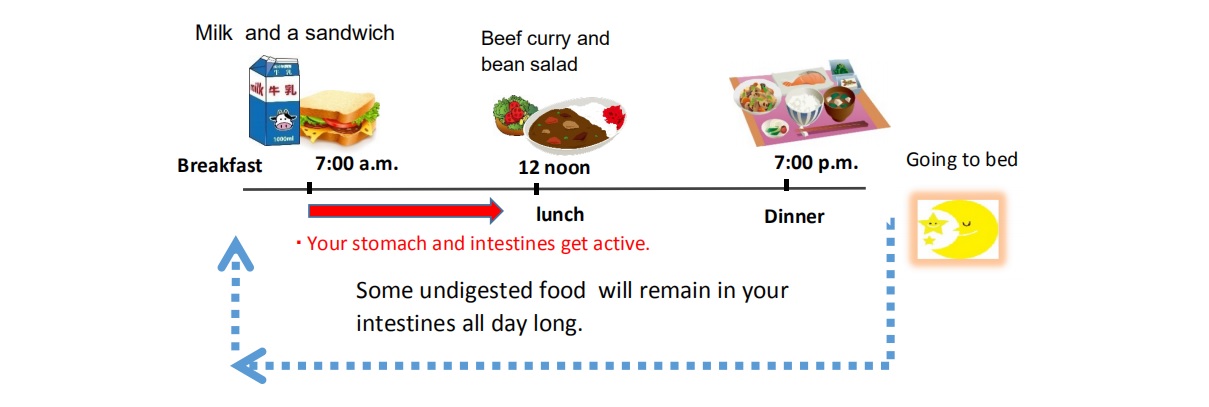
Also, if you eat well both at lunch and dinner, you are less likely to gain weight (meaning that your set-point weight does not go up), since there is some undigested food remaining over a twenty-four-hour period in your gastrointestinal tract.
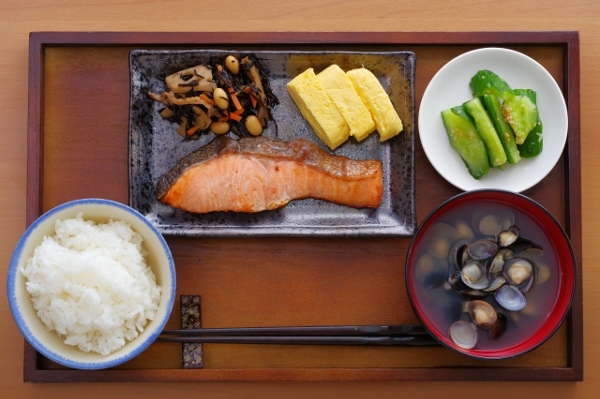
(Typical Japanese breakfast we used to have)
This is the reason why people who are originally slim or medium-sized and have this kind of lifestyle are unlikely to change their body shape throughout their lives, even if they eat without worrying about calories.
However, keep in mind that those who are already overweight will not necessarily lose weight just by eating breakfast (since their set-point weight is already high).
(2) Skipping breakfast makes it easier to gain weight
People who do not eat breakfast may be associated with a nocturnal lifestyle (late night dinner or eating light meals before bed). In short, the main reason for them skipping breakfast may be a lack of appetite or a lack of time to eat.
Not everyone will gain weight if they skip breakfast, but based on my theory, if some conditions are met and overlapped, it makes one more likely to gain weight in the sense that one’s set-point weight increases. If you eat only two meals a day, the interval between meals is longer, so simply what you eat for lunch and dinner has a big impact on the induction of intestinal starvation.
For instance, if you finish dinner at ten p.m., you will not eat for almost fourteen hours until the next day, at noon. Skipping breakfast makes you hungry, so in Japan, people tend to eat lunch with many carbohydrates (rice or noodles) and some meat. Some of them are satisfied with just being full, and their meal may lack fiber and other nutrients.

However, since they have not eaten breakfast, all they have in their gut is that meal at lunch.
If they repeatedly follow a pattern of not eating until eight or nine p.m. in that state, they are likely to induce intestinal starvation little by little, and their set-point weight may go up over time.
Some experts also point out that skipping breakfast and eating a carbohydrate-dense meal when hungry can cause blood glucose levels to spike, leading to high insulin secretion.
This may be true, but in any case, the combination of a "prolonged feeling of hunger" and an unbalanced diet high in carbohydrates and with a lack of vegetables, is likely to increase the risk of obesity and dysglycemia.
You can prevent intestinal starvation by doing the following: if you don't have time to eat in the morning, at least drink some milk, and eat a balanced lunch and dinner with a smaller amount of carbohydrates. And if you have to eat dinner late, eat something such as chocolate or nuts, even around five p.m.
(3) Lightening your breakfast and lunch makes you more likely to gain weight
On the other hand, breakfast can be fattening (in the sense that it increases one's set-point weight) even if one eats it. It is a so-called inverted triangle-type diet, in which breakfast and lunch are light (one might even skip lunch) and dinner makes up for the missing nutrients and calories.
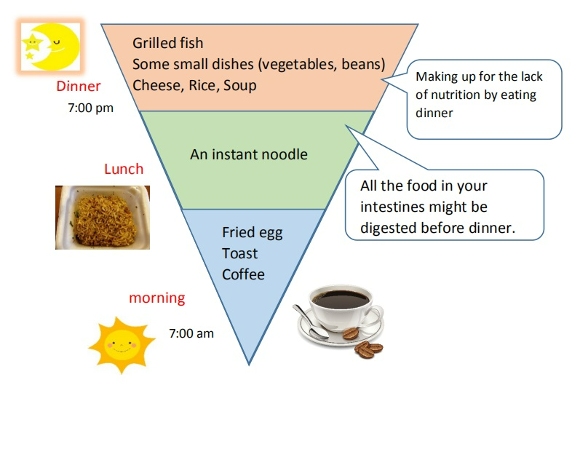
For example, if you just have a light breakfast (a piece of bread, coffee, mashed potatoes, and ham) in the morning, and a rice ball, hamburger, or instant noodles, etc. for lunch, it is easy to induce a intestinal starvation state before dinner, contrary to the situation described in (1) above.
When the gastrointestinal tract becomes active after breakfast, you usually go to the bathroom, and when you do, the only food left in your stomach is what was eaten at breakfast (in this case, mainly carbohydrates and easily digestible protein).
If lunch is also a simple carbohydrate-based meal and lacks fiber and other nutrients, all the food in the intestines will be digested by dinner, which makes it easier to develop a state of intestinal starvation.
In short, if breakfast is well-balanced with choices from the various food groups, you are less likely to gain weight, but if it is a simple and unbalanced one, there is a good chance you will gain weight over the long haul.
Therefore, it is not only a recommendation to eat breakfast, but also to eat a well-balanced one that includes fibrous vegetables, protein, and dairy products, etc.
3. Conclusion
I think what has confused researchers over the years is “whether or not breakfast itself is directly associated with reduced risk of obesity and chronic disease? In other words, is there a causal link there?," and my thoughts, based on the intestinal starvation theory, are as follows:
(1)First, I think it is quite possible that people who usually eat breakfast have other healthy lifestyle habits.

For example, they may eat three times a day regularly, with a well-balanced diet that includes vegetables, dairy products, and protein, etc. throughout the day. They may also exercise religiously, get good quality sleep, and live in accordance with their circadian rhythms.
On the other hand, those who tend to skip breakfast may have a nocturnal lifestyle and poor habits in terms of drinking, smoking, sleeping, and dietary balance.
In short, there might be some confounding factors associated with breakfast.
(2)However, as explained in section [2] above, eating a well-balanced breakfast early in the morning, will prevent intestinal starvation being induced by allowing undigested food in the gastrointestinal tract to remain around ten hours or so. Other health benefits of having undigested food such as fiber and fat in the gut, would include reducing blood sugar spikes and regulating appetite.
On the other hand, an unbalanced breakfast skewed towards easily digestible carbohydrates, proteins, and processed foods, etc. can lead to weight gain, so I do not believe that "breakfast" itself has the effect of deterring weight gain. I’m certain that it is "which foods to combine" at breakfast that matter.
I personally think that if you don't want to eat breakfast, that's fine, but isn't it important to eat lunch and dinner in a balanced manner with a moderate amount of carbohydrates to maintain good health and reduce the risk of obesity?
(3)In my theory, the problem of obesity implies a higher set-point weight, and I believe just eating breakfast does not necessarily lower the set-point weight of a person who is already overweight.
In other words, even if a randomized intervention to "eat or skip breakfast" was conducted in obese or overweight people as in a 2014 U.S. randomized controlled trial (RCT) shown in section [1] above, it may be difficult to demonstrate the benefits of breakfast.
But, this does not mean that breakfast itself is meaningless.
References:
[1]Flanagan A, et al. Chrono-nutrition: From molecular and neuronal mechanisms to human epidemiology and timed feeding patterns. J Neurochem. 2021 Apr;157(1):53-72. doi: 10.1111/jnc.15246. Epub 2020 Dec 10. PMID: 33222161.
[2][3][4]Dhurandhar EJ et al. The effectiveness of breakfast recommendations on weight loss: a randomized controlled trial. Am J Clin Nutr. 2014 Aug;100(2):507-13. doi: 10.3945/ajcn.114.089573. Epub 2014 Jun 4. PMID: 24898236; PMCID: PMC4095657.
[5]Timlin MT, Pereira MA. Breakfast frequency and quality in the etiology of adult obesity and chronic diseases. Nutr Rev. 2007 Jun;65(6 Pt 1):268-81. doi: 10.1301/nr.2007.jun.268-281. PMID: 17605303.
2023.09.08
"When to Eat" Is Important, but It Should Be Paired With "What to Eat"
Contents
- What is chrono-nutrition?
- The importance of meal timing in the recent surge in obesity
- My thoughts
Chrono-nutrition has become increasingly important in recent years, and I have provided a brief background on this topic. At the end of this article, I would like to explain how my intestinal starvation theory relate to “when to eat.”
1. What is chrono-nutrition?
・Living organisms on the earth synchronize their activity to a 24-hour light and dark cycle generated by the rotation of the earth. This biological rhythm is called the circadian rhythm, which means “approximately one day.” Biological clocks are organisms’ natural timing devices, regulating the cycle of circadian rhythms. Recent studies have shown that clock genes such as BMAL1, CLOCK, PERs, and CRYs play central roles in the oscillation of the circadian rhythm[1].
・The circadian clock can be divided into two parts: the master clock, located in the suprachiasmatic nucleus (SCN) of the hypothalamus, which receives light cues, and the peripheral clocks that reside in organs and tissues throughout the body.

External stimuli (time cues) such as the light-dark cycle and the timing of food intake provide daily signals for entrainment (time-setting) of the master clock, and of metabolic rhythms in peripheral tissues, respectively[2].
Peripheral clocks are highly responsive to food intake in addition to the entrainment (synchronizing action) from the master clock.
・‘Chrono-nutrition’ is the study of the interaction between biological rhythms and nutrition, and the relationship between these factors and human health. Chrono-nutrition encompasses distribution of energy, frequency and regularity of meals, duration of the eating period, and the relative importance of these factors on metabolic health and risk of chronic disease. A growing body of evidence in human studies indicates that the timing of food intake throughout the day can have a significant impact on metabolic health and general well-being[3].
In Japan, it is generally believed that in addition to "what and how much" you eat, "when and how” you eat is considered important for maintaining metabolic health.
2. The importance of meal timing in the recent surge in obesity
(1)“What and when we eat” has changed dramatically in modern society.
Mistimed food intake in connection with the day/night cycle, such as skipping breakfast or eating later in the day, can disrupt circadian rhythms, which has been hypothesized to contribute to the development of obesity and associated cardiometabolic disorders[4].
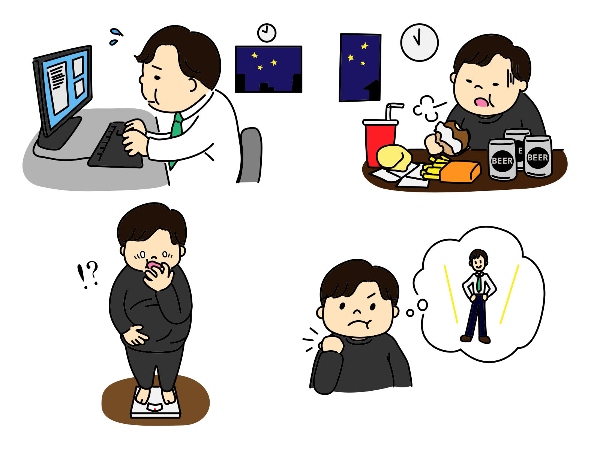
(2) There is a 3.5-year follow-up study showing that consuming a larger proportion of energy earlier in the day or at lunch, appeared to reduce the risk of weight gain[5].
On the other hand, previous observational studies in humans, have linked late eating with a higher risk of obesity and impaired dietary weight loss success that could not be explained by differences in reported caloric intake or physical activity [6].
(3) A short-term study (randomized controlled crossover trial) published in 2022 reported that late eating increases hunger, decreases metabolism, and alters molecular pathways involved in lipid metabolism[7], but it remains unproven whether it makes people obese in the long run.

(4) Previous observational studies suggest that meal timing itself might influence body weight, independent of changes in energy intake and activity-related energy expenditure[8].
The mechanism behind the observed increased risk of obesity and weight gain in shift workers and in populations frequently eating late at night is likely to be multifaceted, and it cannot be explained by disrupted energy intake alone[9].
3. My thoughts
While “total daily caloric intake” is still being emphasized, I think it is a step forward that people are beginning to understand the importance of "when to eat,” even if it is the same caloric intake. And it has been my own experience that incorrect meal timing disrupts my biological rhythms, and I have no doubt that the discovery of clock genes will continue to increase the importance of this field.
In fact, my intestinal starvation theory is related to "circadian rhythms" and "chrono-nutrition.” This is because the gastrointestinal tract gets active when food is consumed. I believe my theory also explains why a well-balanced breakfast and regular eating habits can prevent weight gain, and why irregular lifestyles lead to an increased risk of obesity.
As quoted in section 2 above, some observational studies suggest that "mistimed food intake such as eating later in the day is linked to a higher risk of obesity that cannot be explained by disruption of caloric intake alone." But as I have explained throughout this blog, I don’t believe that obesity itself is directly related to the amount of calories consumed or burned.
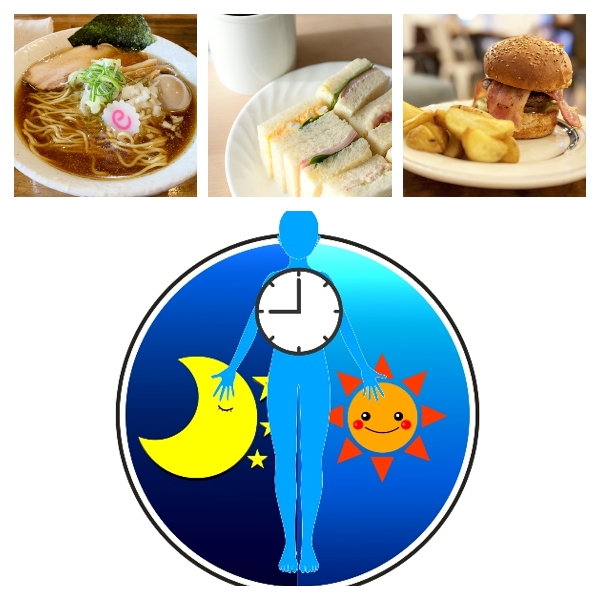
An unbalanced diet skewed toward easily digestible refined carbohydrates, protein, and processed foods is more likely to cause intestinal starvation when combined with irregular meal timing. This typical meal timing pattern is represented by skipping breakfast or eating late at night.
If obesity cannot be easily treated by returning to eating at regular times during the day, it means that one's set-point for body weight has increased.
[Related article]
In other words, "when to eat" is important, but "what and how to eat" is important as well, and I believe they must always be considered as a set. If we focus only on caloric intake, we may forget the importance of traditional eating styles and dietary balance. (Note: Some Japanese nutritionists often stress how important the traditional Japanese diet is in addition to "what, when, and how you eat” for maintaining good health, and I totally agree with them on that point.)
In the category of "chrono-nutrition," I'll break it down into four articles on (1) breakfast, (2) late dinners, (3) frequency of eating, and (4) irregular meals, and explain in more detail how they relate to my intestinal starvation theory.
[Related article]
The Reason Why a Well-Balanced Breakfast Helps to Prevent Weight Gain
References:
[1]”What is a circadian rhythm?”, MEDICAL & BIOLOGICAL LABORATORIES CO., LTD.
[2] [3]Flanagan A et al., Chrono-nutrition: From molecular and neuronal mechanisms to human epidemiology and timed feeding patterns. J Neurochem. 2021 Apr;157(1):53-72. doi: 10.1111/jnc.15246. Epub 2020 Dec 10. PMID: 33222161.
[4] [5][9]Davis R et al., The Impact of Meal Timing on Risk of Weight Gain and Development of Obesity: a Review of the Current Evidence and Opportunities for Dietary Intervention. Curr Diab Rep. 2022 Apr;22(4):147-155. doi: 10.1007/s11892-022-01457-0. Epub 2022 Apr 11. PMID: 35403984; PMCID: PMC9010393.
[6][7][8] Vujović N et al., Late isocaloric eating increases hunger, decreases energy expenditure, and modifies metabolic pathways in adults with overweight and obesity. Cell Metab. 2022 Oct 4;34(10):1486-1498.e7. doi: 10.1016/j.cmet.2022.09.007. PMID: 36198293; PMCID: PMC10184753.
2022.10.21
People Who Usually Eat Less, and Who Occasionally Splurge, Gradually Gain Weight
Contents
- People who gained weight during the Covid self-quarantine period
- A wrong strategy is to skip a meal today because you ate too much yesterday
- Daily actions taken by people who are gradually gaining weight
<The bottom line>
1. People who gained weight during the Covid self-quarantine period
According to a survey, more than fifty percent of Japanese people put on some weight during the period of staying at home by government order to prevent the spread of the coronavirus.
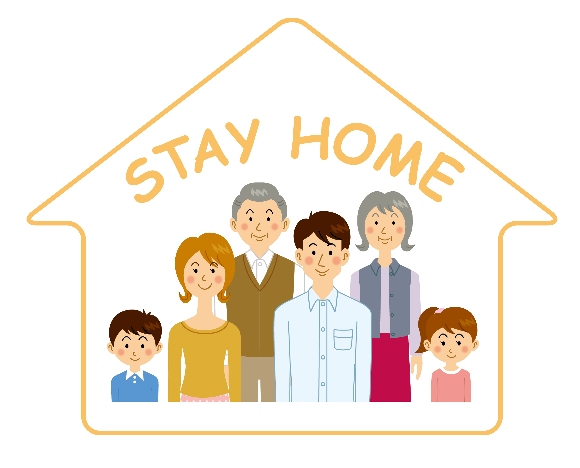
I saw a woman on television. She is a dance instructor and gained more than ten kilograms during this period.
Also, a friend of mine who owns a Japanese restaurant and works as a chef, gained almost five kilograms. He usually skipped breakfast and did not eat much dinner after his restaurant closed (around 11:00 p.m.), but during this period of self-quarantine, he stayed at home watching television and eating three times a day.
I think two classic examples of "eating a lot or stopping exercising makes you fat" fit here.
Normally, these people were under the strain of their jobs, moving all day long, eating in moderation, and paying attention to caloric intake. If that tension is gone and they simply exercise less and eat more, they will naturally gain weight.

However, this is the same pattern as rebounding, which means their weight go back to their set-point weight ([A] in Figure).
2. A wrong strategy is to skip a meal today because you ate too much yesterday
Sometimes I hear people say, "I ate too much at the all-you-can-eat buffet yesterday and gained three kilograms in one night.” They may have simply gained body fat or the weight of the food in their gut may also be a factor.
But It is a big mistake to say, "Okay, let's skip today's lunch."

Food ingested yesterday has already passed through the gastrointestinal tract and may be excreted in the form of a stool, but if you eat less today and put up with hunger over many hours, intestinal starvation may be induced, and your set-point weight may increase slightly.
So, it does not make sense to offset the extra calories you ate yesterday by eating less today.
3. Daily actions taken by people who are gradually gaining weight
With the recent gourmet food boom, many delicious foods are introduced on television and social media, while many people are worried about gaining weight and are trying to eat less.

Many of them usually restrain themselves as much as possible on the foods they want to eat, cutting back on calorie-dense foods such as sweets or fried foods.
Then, they splurge once in a while and eat their favorite foods as a reward.
In the end, they regret the weight they have temporarily gained and say, "Let's start dieting again tomorrow," and engage in a calorie-restricted diet.
I have no doubt whatsoever these diets are rarely successful. Rather, they tend to gain weight little by little. Eating on and off, or eating unevenly, is the first step toward becoming overweight.
If you skip meals or eat light meals (e.g. hamburgers and coffee) to reduce calorie and carbohydrate intake, you will deal with hunger for a longer period of time.
Even if you lose a little weight temporarily, the lack of fats/oils, dairy products, and fibrous vegetables can lead to intestinal starvation and an increase in your set-point weight over the long haul.
Unknowingly, your set-point weight may go up, and one day, when you eat like you used to, you may find that you have reached your highest weight ever. And it will be harder to lose weight than before.
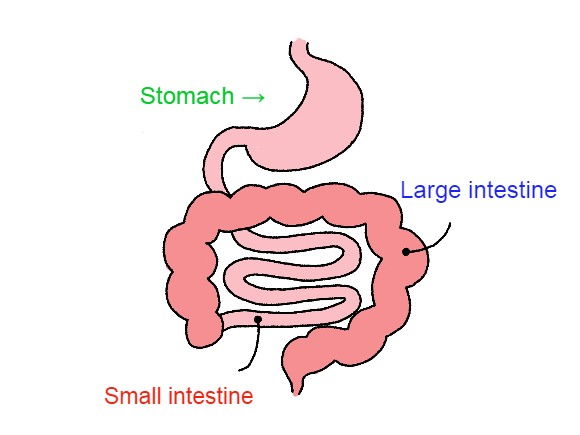
The gastrointestinal tract starts by eating breakfast, and the food we eat is delivered to the rectum in around twenty hours or more (it differs from person to person).
Therefore, it is a mistake to say, "I ate too much yesterday, so I will skip lunch today," or "I ate a lot of fibrous vegetables yesterday, so I don't need them today.”
It is also a mistake to say, "I will eat enough vegetables and nutritious foods at dinner, so I will go with a light breakfast and lunch," because a combination of easily digested food can result in intestinal starvation in as little as six to eight hours.
The first step in becoming leaner is to eat three well-balanced meals religiously every day.
Even if you want to reduce total caloric and carbohydrate intake, be sure to consume a variety of foods from a diverse group of foods.
The bottom line
(1) Some people claim to have gained a few kilos during the Covid self-quarantine period, but I believe most cases can be explained by a return to one’s set-point weight as well as a rebound effect after dieting.
(2) The idea of adjusting for yesterday's excess calories by eating fewer calories today is a mistake when it comes to maintaining a stable weight in the long run.
(3) People who usually eat less and hold back on the foods they want to eat for dieting, and occasionally splurge on treats, are more likely to gain weight over the long haul.
Irregular eating, where a person eats on and off, can cause intestinal starvation when dealing with hunger over many hours, unknowingly increasing their set-point weight.
(4) Since the gastrointestinal tract basically begins with breakfast and the food we eat reaches the rectum in around twenty hours or so (it differs from person to person), it is important to eat three well-balanced meals every day if you do not want to gain weight.

